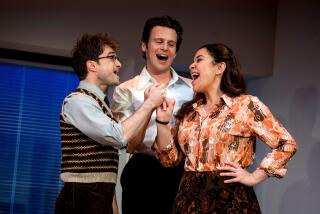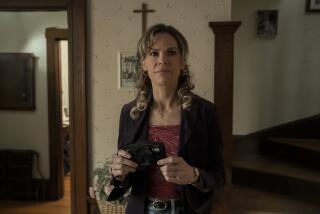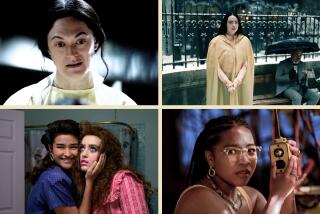Mary J. Blige finds the love through the hard times depicted in ‘Mudbound’ and the darkness of today’s world
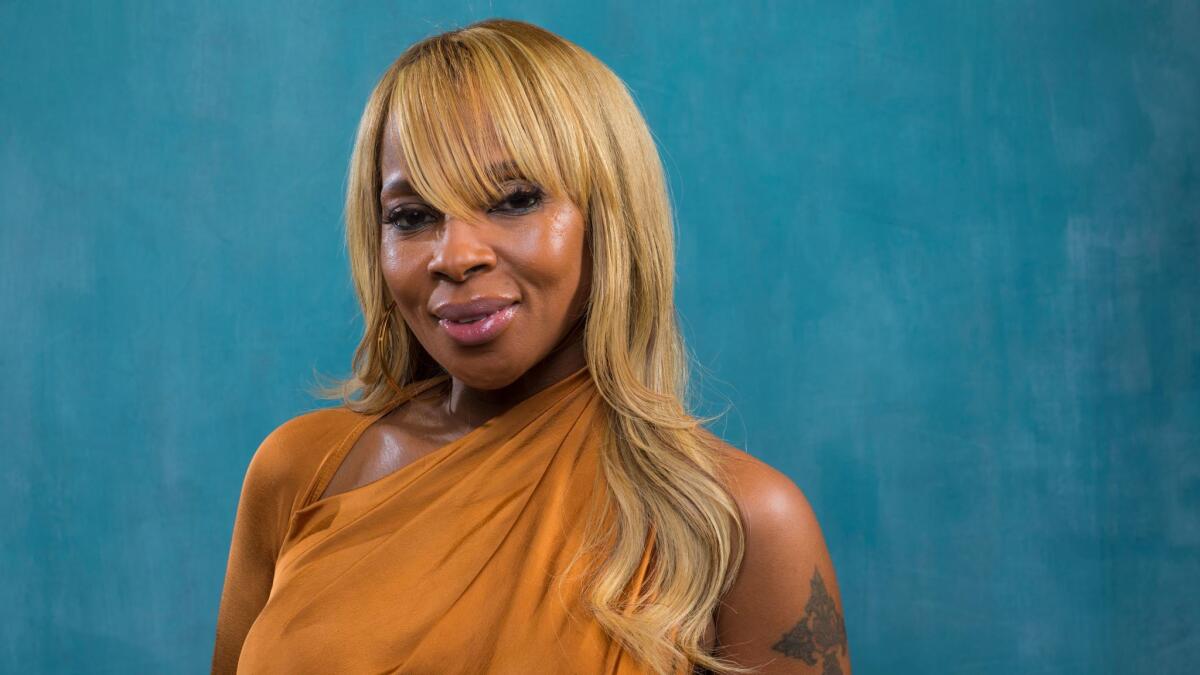
During a post-“Mudbound” screening Q&A, director Dee Rees was asked a question that her star, Mary J. Blige, didn’t know the answer to: What inspired Rees to cast Blige — the “Queen of Hip-Hop Soul” and the seller of over 50 million confession-heavy albums — in her Netflix period drama? “She said she loved me in ‘The Wiz,’” says Blige of the 2015 TV adaptation of the Broadway musical in which she gave a stage-owning performance as Evillene, the wicked witch. “I just thought, ‘Oh, wow.’ [Dee] never told me that.”
Another thing Rees didn’t tell Blige: In her turn as Florence, the wife, mother and beating heart of a Mississippi Delta cotton-farming family, Blige would be unrecognizable. “I cried,” says Blige about sitting in the audience at the Sundance premiere of “Mudbound.” “I was, like, ‘Oh, God. Who is that?’ I couldn’t see myself.”
Two days before the Golden Globes — she was nominated for supporting actress and original song for “Mighty River” — the appealingly straightforward Blige sat in a Four Seasons hotel room, talking about delivering a career-altering performance just as her 12-year marriage was unraveling, and suddenly being taken seriously as an actress in Hollywood. “I know I went to New Orleans to try to do something great, to pour my heart out into something,” Blige says. “But I didn’t see this coming.”
WATCH: Video Q&A’s from this season’s hottest contenders »
Draw a line between you and Florence.
Florence was like my grandmother, my aunts. She was a Southerner. My family are Southern people. They were these strong, strong women who didn’t say a lot but their husbands listened to them. They were sharecroppers, had farms, cows, chickens and whatever they killed or got out of the garden, we ate. I was being prepped for [Florence] since I was a little girl.
That said, the role came to you at a difficult time in your life.
Fortunately, I have a friend who’s a great acting coach, Tasha Smith. I’d show up to her house crying, talking about my hell. She didn’t baby me. She’d say, “Sis? I love you but I don’t want to hear it. Save it all for Florence.” So Florence became a place for me to lay all my stuff, to just give it to somebody else.
When were you told that Florence’s look would be glam-free?
Not until I got down there. Dee was like, “I want it all natural.” And I was like, “What? I have to show my own textured hair?” When it was time to strip away the wigs and weaves, it made me nervous. I negotiated for, like, two days in a row. I’d say to Angie Wells, who did the makeup, “Can I get a strip of lashes?” and she’d say, “No, Dee doesn’t want any lashes [laughs].”
Then I just surrendered. I was running around with a full Afro and no makeup. [Florence] gave me new confidence. People were whistling and hitting on Florence and saying, “Wow, Florence is so beautiful.” It really helped me a lot. It was like, “Mary? It’s not as bad as you think. You don’t need all this stuff to feel good.”
Talk about shooting a film in 28 days at St. Joseph’s Plantation, an active sugar farm so remote that actors rarely left the set.
[Temperatures were] in the three digits every single day. Some days it would rain and we’d have to wear rain boots to walk through the mud, which was just ridiculous, to get to our location. And the mosquitoes, there were so many of them. [laughs] Lots of times we couldn’t just go back to the trailer because it was so far away. So we’d just sit all day in costume, [staying] in character.
Were there lots of sharing sessions regarding your tricky emotional time?
I didn’t tell a soul. Nobody knew. I didn’t think it was anybody’s business and because it was the beginning of everything that was about to explode. I didn’t think that it was something for me to be on set with these new people, who I just met, and say, “I’m going through hell and I might be getting a divorce.” It hadn’t hit yet. I was just thinking, “I can’t believe what I’m going to have to do.”
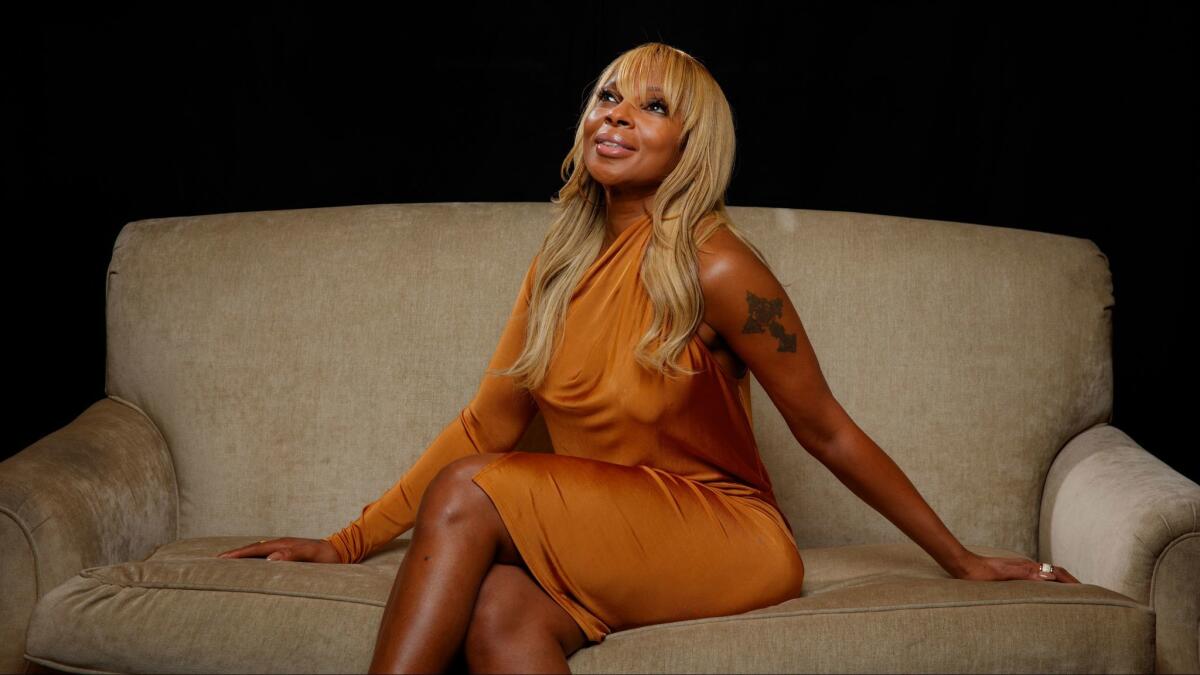
What did your “Mudbound” experience clarify for you, then?
Great things are sometimes born out of hard times, out of trials and tribulations. This is a dark time we’re having in the world, but I think something great is being born out of it, that it’s uniting people all over the United States. My life has been nothing but ups and downs. Something great will happen, then something terrible will happen. And it teaches you how to appreciate the good.
There were women in key positions throughout the “Mudbound” crew. Had you ever been in that sort of work environment?
No. And I tell you, it was calm and beautiful and confident and everyone knew what they were doing. It was hot and everyone was burning up but there were women everywhere and it was beautiful.
Was singing and co-writing “Mighty River” a package deal?
They didn’t ask until the movie was done. But I was waiting — patiently — for them to ask. The words came from what I saw as the silver lining in the movie. Which is love. That’s the part that saved everybody. I looked at the mud as being the negativity. Love is the mighty river that’s going to fix everything.
How does film acting differ from performing for 50,000 screaming fans?
I’m not as nervous in front of a whole bunch of people as I am in front of a camera. The difference being in front of 50,000 people is you’re just having a good time, just letting it rip. But that whole camera thing? I’m transparent anyway. In front of a camera you find out how shallow or afraid or whatever you are. For real. It’s like spending alone time. When we have to deal with ourselves it’s sometimes a creepy thing. But when we’re ready, it’s great. I’m ready.
More to Read
From the Oscars to the Emmys.
Get the Envelope newsletter for exclusive awards season coverage, behind-the-scenes stories from the Envelope podcast and columnist Glenn Whipp’s must-read analysis.
You may occasionally receive promotional content from the Los Angeles Times.
